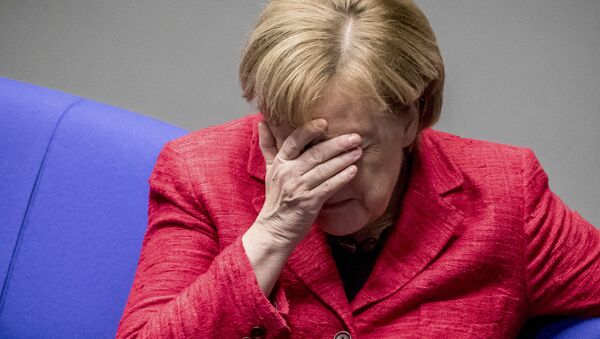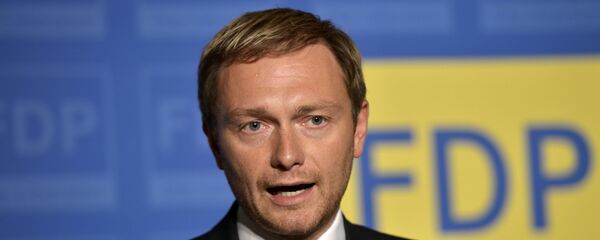MOSCOW (Sputnik) — Following the failure of governing coalition talks in Germany, the country faces no good options for further developing the situation, with snap elections being an undesirable yet most feasible variant, experts told Sputnik.
"My prediction would be new elections, probably in March," Mark Hallerberg, dean and professor of public management and political economy with the Hertie School of Governance, told Sputnik in response to a question about what path Germany was facing.
Elmar Altvater of the Otto-Suhr-Institut at the Free University of Berlin stressed that calling for fresh election was risky, pointing that the "failure of the coalition talks opens opportunities for the promotion of populist discourses," and the AfD is "waiting on its chance."
READ MORE: 'Super Stable' Germany Going Through Political Transition – German Journalist
This opinion was echoed by Helmut Norpoth, a US political scientist and professor of political science at Stony Brook University, who said that re-election was "a terrible idea" and not a way out of the situation.
"I don’t know what kind of a coalition would be coming out of that. I don’t see there is any better chance of the CDU and the FDP having enough to do it or CDU and the Greens. And the only thing I can see is that AfD get even stronger and that’s going to make it even more difficult," he stated, adding that the AfD will pick up "even more" where the CDU/CSU will lose.
According to Altvater, calling an election at this point seems the only option left, because a minority government was "not very probable."
Failure of Coalition Talks
According to Altvater, the coalition talks are also barely possible, given the positions of both the SPD and FDP.
Gero Neugebauer, a political scientist with the Otto-Suhr-Institut, also believes that coalition talks are unlikely.
"In my opinion, there will be no further coalition talks. The Social Democratic party will not join a coalition with the conservatives. The party could lose its credibility, because [it] has declared to stay outside of coalitions. I think, they will keep this position," Neugebauer told Sputnik.
Altvater reminded that the Greens would be very reluctant to return to the Jamaica coalition talks following their "provocative break."
"Perhaps talks on a renewal of the Grand Coalition will be resumed. But this would be very dangerous for the SPD after the very clear declarations against the continuation of a SPD-CDU coalition articulated by [SPD leader Martin] Schulz and other leading Social Democrats. The outcome of talks on a grand coalition perhaps is a split of the SPD," Altvater stated.
READ MORE: As German Coalition Talks Collapse, Merkel's Troubles Distract From Brexit
And even if the split of the party could be avoided, building the grand coalition would still require a change of leadership in the SPD, the expert added.
However, Norpoth said he was confident that "some [coalition] talks will take place," pointing out that maybe German President Frank-Walter Steinmeier, who is an SPD member, "is going to lean on his party to come back and help out," despite the fact that the party has already rejected the possibility of building coalition and "they don’t change their mind."
'Good Test for Merkel'
"There will be some power play going on. It will be a good test of Merkel whether she has the skills to pull it off," the expert reiterated, adding that the chancellor does not "look very good right now."
The one possibility left is creating the so-called Kenya coalition, comprised of the CDU/CSU, the SPD and the Greens and named after the colors of the parties — black, red and green, the same as the colors of Kenya’s flag.
"But Kenya is not attractive for the Green. A small party between two big blocks opens a sad perspective," Altvater stated.
READ MORE: AfD Leader Urges Chancellor Merkel to Resign as Coalition Talks Collapse
If new elections are called, their results will once again leave options limited to a Jamaica coalition and attempting to unite with the SPD after all, he added. The CDU/CSU could follow the example of Austria, where the winning center-right Austrian People's Party (OVP) is in coalition talks with the right-wing Freedom Party of Austria (FPO), and try to bring the AfD into their "more rightist political project," the expert continued.
"This would be the end of Angela Merkel as a political leader," Alvater concluded.
Situation Unprecedented in 70 Years
On Sunday, leader of Germany's Free Democratic Party (FDP) Christian Lindner announced that his party had quit the coalition negotiations with Chancellor Angela Merkel’s Christian Democratic Union and Christian Social Union (CDU/CSU) alliance and the Greens. If agreed on, the so-called Jamaica coalition would have had 393 mandates in total, which would have been enough to establish a majority in the 709-seat Bundestag.
Most recently, Lindner ruled out the possibility of FDP entering the Jamaica coalition even in case of a new vote, blaming it on the impossibility of cooperating with the Greens.





